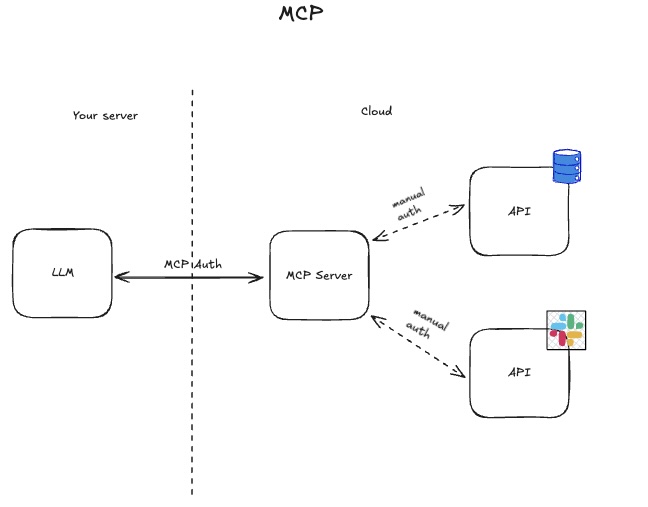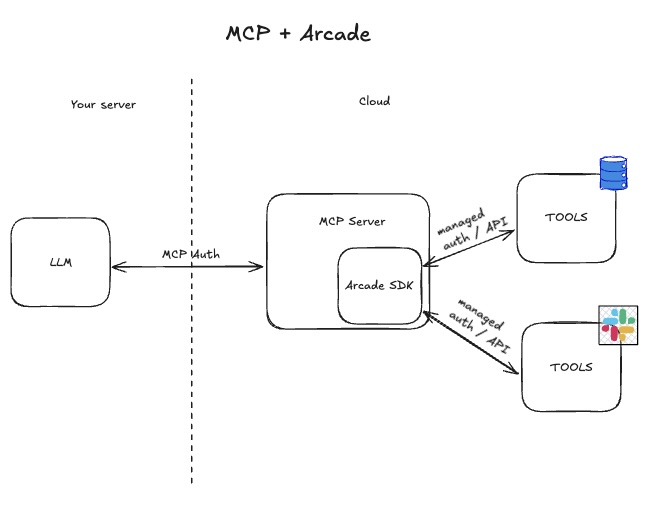Model Context Protocol (MCP): The Arcade.dev Perspective
What is MCP and Why Should Developers Care?
Model Context Protocol represents a significant step toward standardizing how AI agents interact with tools and external systems. As the developer-first platform for authenticated tool-calling, Arcade.dev has been at the forefront of connecting AI models to real-world actions - which is why our perspective on MCP matters.
For developers building AI applications that need to do more than just generate text, understanding the strengths and limitations of protocols like MCP is critical to making informed architecture decisions.
The Current State of Model Context Protocol
MCP aims to standardize how AI models access and use applications to get data or use tools - a problem space Arcade.dev has been solving since day one. While the protocol rightly focuses on how applications provide context to LLMs, our hands-on experience building production agent systems reveals both opportunities and challenges.
Where MCP Gets It Right
- Standardization attempt: Creating common patterns for tool definitions across different AI providers is a step in the right direction. It allows agent builders to switch between different LLM providers and optimize costs and performance for each component using an LLM.
- Focus on function-calling: Correctly identifies that giving AI models the ability to call functions is fundamental to realize the agent’s full potential. The protocol got the difference between LLM resources and regular APIs right from the beginning. While traditional APIs are designed for developers to use, LLM-optimized tools require additional context to be used effectively by AI systems. The recognition of what we call Machine Experience Engineering is something MCP designers also identified early on.
- Community momentum: Building adoption across multiple providers creates healthy ecosystem dynamics, giving all actors that adopt MCP the benefits of a robust, well-tested and growing ecosystem of LLM-ready resources, both local and remote.
Where MCP is Evolving
- Authentication gaps: The protocol was initially designed for local resources only, and required considerable technical knowledge to integrate with clients like VSCode, Cursor, and Claude Desktop. 99% of MCP servers today are built for single-user use, even hosted ones. If you need to configure the MCP server with a PAT (personal access token) or an API key, it’s not usable by a multi-user (B2B2C) or cloud-based agent. At a minimum, MCP servers need to support HTTP, MCP authorization, and support multi-user authorization. Having a robust standard for tool calling without the same robustness for auth quickly began the adoption of ad-hoc solutions that were more or less insecure for remote tool calling, the #1 bottleneck in moving AI agents to production. Fortunately, active work is ongoing on the MCP community to adopt a solid auth component in the protocol. Arcade.dev’s own auth team actively contribute to the specification in this crucial area.
- Production readiness: Enterprise-grade concerns like observability, security, and compliance need stronger representation. As the protocol evolves, we expect all of these aspects to be integrated into the protocol.
- Developer experience: Implementation complexity can create significant friction for teams without specialized AI expertise. MCP is a very new protocol undergoing rapid changes, so the DX is expected to be turbulent until the protocol matures. Arcade.dev supports this from day one while providing the best DX for building tools that can be served over MCP to any AI agent.
How Arcade.dev Complements and Extends MCP
Rather than viewing MCP as either perfect or problematic, we see it as part of an evolving ecosystem. Arcade.dev bridges critical gaps in the protocol by providing:
- Authentication-first architecture: Secure, OAuth-based connections that let AI access tools as the end user - not as a “bot”
- Production infrastructure: Monitoring, logging, and evaluation capabilities built for enterprise deployment. This also includes improvements to tool selection when many tools are enabled.
- Developer acceleration: SDKs that dramatically reduce time-to-value when implementing tool-calling patterns
- Multi-model compatibility: Works seamlessly with all major LLM providers, regardless of their MCP implementation status. You can start building your agents today, and switch to MCP seamlessly when your LLM provider supports it, or when the MCP SDK reaches enterprise level readiness
 |  |
Why This Matters for Your AI Applications
AI that can’t authenticate to access accounts or use data is fundamentally limited. This disconnect is why less than 30% of AI projects go to production.
The biggest opportunity in AI today isn’t better models—it’s enabling those models to take real actions. Developers need secure connections between AI and authenticated services, user data, and enterprise systems.
By combining MCP’s standardization efforts with Arcade.dev’s authentication-first approach, developers can build AI applications that don’t just suggest actions—they take them.
Our Commitment to the Protocol Ecosystem
At Arcade.dev, we’re active participants in the evolving tool-calling ecosystem. Our team contributes to open standards like MCP while building the production-grade infrastructure developers need today.
As Sam Partee, our CTO, explains: “Protocols like MCP are important stepping stones toward more capable AI agents. Our focus is making sure developers can build with these patterns today, with authentication and security baked in from the start.”
Frequently Asked MCP Questions
Is Arcade.dev an alternative to MCP?
No. Arcade.dev complements protocol standards like MCP by providing the authentication layer, developer tooling, and production infrastructure needed to implement them successfully in real-world applications. Arcade’s Engine can be an MCP server with super-powers, and you can pull in upstream MCP servers as tools into Arcade.
Do I need to understand MCP to use Arcade.dev?
Not at all. Arcade.dev provides intuitive SDKs that handle the complexities of tool-calling patterns, regardless of which underlying protocol standards are in use.
What models work with Arcade.dev’s approach to MCP?
Arcade.dev works with all major models including Claude, GPT-4, Llama, Mistral, and more - supporting both MCP-compatible and non-MCP implementations through our unified API.
How does Arcade.dev handle authentication within the MCP framework?
Arcade.dev extends(*) basic MCP implementations with enterprise-grade OAuth flows, secure token management, and fine-grained permissions - solving the authentication gap that often blocks production deployment.
(*) Arcade is currently compatible with the existing ratified MCP specifications, and is working to extend them for tool authorization.